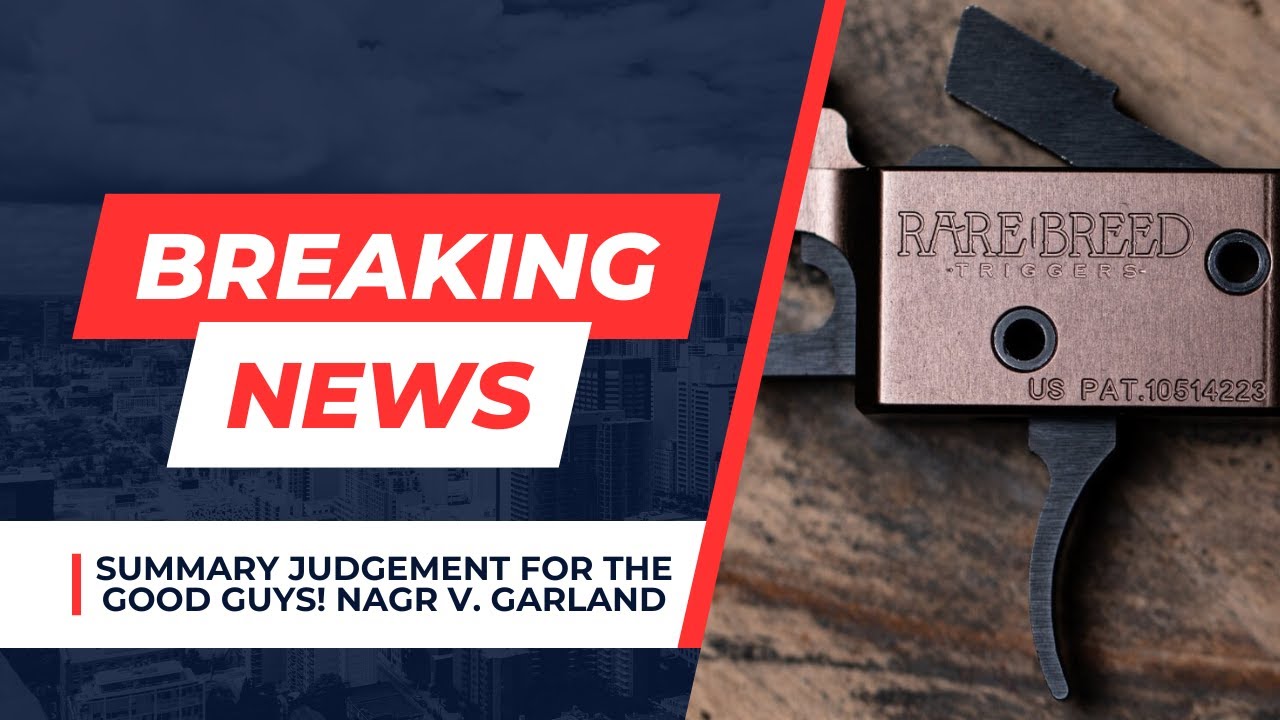The Bureau of Alcohol, Tobacco, Firearms and Explosives (ATF) lost another case in federal Court yesterday in the Northern District of Texas Fort Worth Division.
The case, National Association for Gun Rights (NAGR) v. Garland, challenged the ATF’s ruling that forced reset triggers (FRTs) are machine guns. NAGR teamed up with Rare Breed Triggers to sue the federal government, claiming that the ATF overstepped its authority when it started enforcing a ban on FRTs.
An FRT uses the bolt carrier group to force the trigger to reset, significantly increasing the fire rate of an AR-15-style rifle. Unlike an automatic or select-fire gun, the trigger must reset between each shot, and the shooter must pull the trigger. Under federal law, a machine gun expels multiple rounds with a single function of the trigger.
The battle over FRTs started in July 2021 when the ATF sent Rare Breed Triggers a cease-and-desist letter demanding the company stop selling its popular FRT-15 triggers. Rare Breed Triggers refused to comply with the ATF’s demands and continued to sell the item on its website, leading to multiple lawsuits.
In January 2022, ATF agents showed up at the door of Big Daddy Unlimited (BDU) and confiscated the company’s complete stock of Wide Open Triggers (WOT) and FRT-15s. In April 2023, ATF agents started visiting gun owners who purchased FRT triggers from BDU. The visits began in Texas and spread across the country. The source of the customer list is still unknown, although BDU denied turning over customer information during the time period of the ATF visits. No one faced arrest, but the ATF did confiscate the triggers.
In August 2023, the ATF sent out letters to FRT owners telling them that they may be in possession of an illegal machine gun. Most buyers purchased the triggers from an online seller known as RifleRemedy2000. The Gunbroker seller denied giving over information, although he did admit to AmmoLand News that the ATF did raid him and take his devices. He claimed no customer information was stored on those devices.
Now, because of the summary judgment issued by Federal District Judge Reed O’Connor, the ATF has 30 days to return all confiscated triggers. The Bureau is also barred from destroying any triggers in its possession. The ATF must also send out letters to anyone it contacted in the past to make them aware that FRTs are not machine guns. The ATF is barred from taking any civil or criminal action against owners, manufacturers, and sellers of FRTs.
The judge heavily relied on the Cargill decision when issuing the summary judgment. That Supreme Court opinion stated that the ATF overstepped its boundaries when it ruled that bump stocks were machine guns even though it doesn’t fire automatically with a single function of the trigger. If bump stocks are not machine guns because it takes multiple functions of a trigger to fire multiple rounds, then the only conclusion is that FRTs also cannot be considered machine guns. This distinction makes the rule a violation of the Administrative Procedures Act (APA).
“Furthermore, the APA does not prohibit pre-enforcement judicial review. Under the APA, federal courts have the authority to review challenges to agency actions on a pre-enforcement basis,” the order reads. “To be sure, Defendants are correct that this authorization does not expand the Court’s jurisdictional beyond tradition limitations. See 5 U.S.C. § 702 (‘Nothing herein (1) affects other limitations on judicial review or the power or duty of the court to dismiss any action or deny relief on any other appropriate legal or equitable ground; or (2) confers authority to grant relief if any other statute that grants consent to suit expressly or impliedly forbids the relief which is sought.’). But permissible challenges nevertheless include an endless variety of agency actions that are ‘otherwise not in accordance with law.’ 5 U.S.C. § 706(2)(A).”
The ATF could appeal the District Court’s decision, but it is a long shot that the Fifth Circuit Court of Appeals will decide for the ATF, considering its ruling in Cargill. SCOTUS will be less likely to take up the case if the ATF loses at the Fifth Circuit due to its similarity with the Cargill case.
About John Crump
John is a NRA instructor and a constitutional activist. Mr. Crump has written about firearms, interviewed people of all walks of life, and on the Constitution. John lives in Northern Virginia with his wife and sons and can be followed on Twitter at @crumpyss, or at www.crumpy.com.








hoping trump will get rid of them and have attorney general kill gca and nfa as unconstitutional
Face it the BATF is comprised with a bunch of losers and the whole unconstitutional organization needs disbanded and done away with .
The ATF got their list of purchasers by collating credit card data with shipping data – easy peasy. It’s not like the anti-gun banks & shippers would even request a warrant in order to turn over said data on the evil gun people…
Had a conversation with a friend yesterday that I sent a text to and added the previous article link regarding this in celebration. My celebration was short lived because he stated the new Omnibus bill states that FRT and binary triggers will be illegal on Jan 1 2025. He stated he got the information via the VA website.
I hope he is wrong.
I can’t find that anywhere.
Can you get a link to post?
He said he would send a link but hasn’t done it yet. I looked at the VA site and couldn’t find it either.
It appears to be a Minnesota law, not federal:
https://gunowners.mn/learn/binary-trigger-ban/
i am still asking him for the link to support what he said.